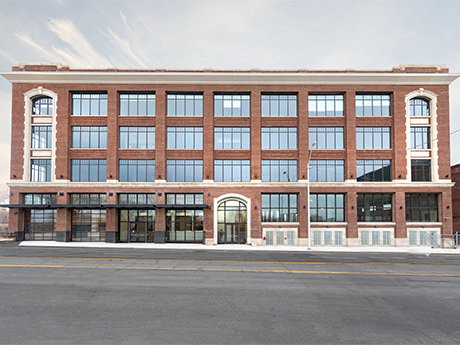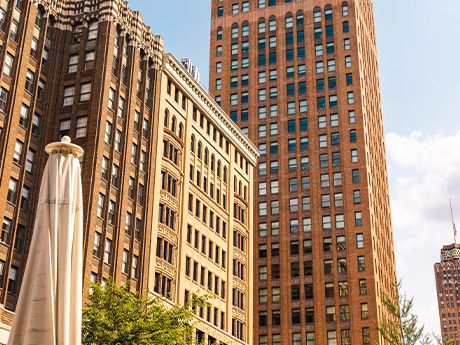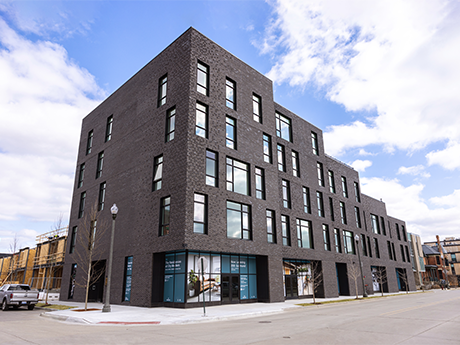Over the past decade, Detroit has undergone a period of revitalization, both culturally and economically. At the start of the early 2010s, the city’s Midtown and central business districts attracted multiple high-profile investors led by Detroit native and billionaire Dan Gilbert, the founder and chairman of Rocket Cos. (NYSE: RKT), formerly known as Quicken Loans. Gilbert’s hometown pride can’t be denied, and his investment started what is commonly referred to as the “Detroit Renaissance.” After moving the headquarters for Quicken Loans to downtown Detroit from the western suburb of Livonia in 2010, he launched real estate company Bedrock a year later.
It was a risky move to bet so heavily on commercial real estate in the city of Detroit, especially considering that the city filed for Chapter 9 bankruptcy in 2013. With more than $18 billion in debt — mainly from worker-related obligations such as pensions and healthcare — it remains the largest municipal bankruptcy in U.S. history.
But Gilbert’s calculated gamble paid off. Bedrock went on to invest $5.6 billion in more than 100 properties throughout the city and nearby neighborhoods. As Detroit’s largest employer with 17,000 employees across his family of companies, Gilbert’s investment in a Motor City empire is starting to reap rewards for the city as a whole.

This infusion of capital has not only gone a long way to revitalizing the city, but it’s also made it attractive to further investment. Multiple Fortune 500 players such as Dow and Whirlpool currently call Detroit home, sitting alongside hometown automobile manufacturers like General Motors.
High-tech is also finding a home in this thriving environment, with Microsoft, Google and Pinterest all opening offices in the city in the past decade. Additionally, Google teamed up with Dearborn-headquartered Ford Motor Co. at the start of the year to revitalize the former Michigan Central Station into a 30-acre mobility and innovation campus. The $950 million project is set to open in mid-2023 in Detroit’s Corktown neighborhood.
With these levels of corporate investment, the Motor City’s job market is heating up and demand for multifamily housing has ensued.
“Demand is near an all-time high for apartments in downtown Detroit,” says Jonathan Mueller, vice president of development for Bedrock. “This is a continuation of a performance of robust, demand-setting records with new deliveries increasing five percent year over year.”
Hitting the Gas on Growth
This renewed interest in Detroit has not only revved up the job market, but also investment in the multifamily sector. During the second quarter, the multifamily market for the Detroit metro area experienced a significant rise in both asking rents and occupancies. According to CBRE, the average asking rental rate increased to $1.41 per square foot in the third quarter of 2022, a 25.9 percent rise since 2018.
“From a buyer’s standpoint, one of the main driving factors for investing in Michigan has been yield,” says Gordon Navarre, first vice president of investments for Marcus & Millichap. “Because of the perceived higher risks in Michigan, investors have been able to buy in at a lower basis and achieve higher cap rates.

“This, coupled with our affordable rents with room for growth and demand from lack of supply, create a great story and investment strategy for buyers with a little more risk tolerance.”
According to Dallas-based RealPage, the occupancy rate for apartments across all classes remained healthy over the past four years rising slightly from 96.5 percent in the third quarter of 2018 to 97.6 percent in the third quarter of this year.
“Detroit is maybe a market with more surprisingly strong fundamentals than those not active in the market might realize,” says Carl Whitaker, director of research and analysis for RealPage. “Occupancy has consistently outperformed U.S. norms in recent years, with today’s rate of 97.6 percent actually among the highest in the country.”
Investors and developers are taking notice of the numbers. Year-to-date through August, investors in the metro Detroit multifamily sector closed nearly $853.3 million in transactions, up 131 percent on a year-over-year basis, according to MSCI Real Assets. The data is based on property and portfolio sales $2.5 million and above.
For all of 2021, the metro area saw more than $1.9 billion in multifamily transactions, up from approximately $357.9 million in 2020 and $594.3 million in 2019.
The emerging consensus is that property and portfolio sales are poised to cool during the year’s final quarter. “We’re in a little bit of a market/sales pause right now due to rapid interest rate hikes,” says Navarre. “This has created a gap between sellers’ expectations and buyers’ ability to attain reasonable returns. However, when the market normalizes, I believe we’ll be back on track.”
When it comes to other market selling points for investors, Navarre points out that Detroit’s cost of living is substantially less than in comparison to other cities in the Midwest. Additionally, Detroit continues to remain attractive to business, creating a healthy job market.
Though many outside the market may not yet realize the potential within Detroit’s city limits, local developers are taking a page out of Bedrock’s book. For example, Detroit-based Jackson Asset Management and Hosey Development are in the process of a $134 million redevelopment of the city’s iconic Fisher Body Plant into 400 mixed-income housing units.
Investment is also heating up in Detroit’s suburbs, particularly in live/work/play developments. SK Investments Group revealed plans in June to develop The Shores at Crystal Lake, a 34-acre mixed-use development with more than 1,200 units in the northern suburb of Pontiac, slated to open in mid-2023. Additionally, Andover Real Estate Partners and M Group LLC went in on a joint venture to acquire the 154-unit Summit Apartments in Farmington Hills for $31.5 million.

Property Taxes at Issue
Like Chicago, the issue of rising property taxes continues to be a challenge for developers in Michigan, along with high inflation and rising interest rates. Additionally, supply chain issues and labor shortages in building and construction are hindering an otherwise great-looking marketplace.
“If you fast forward to 2022, one of the biggest challenges from a business planning standpoint is the property taxes,” says Navarre. “The resetting of property taxes for buyers in Michigan is inconsistent depending on the municipality governing them. The respective assessing department determines the State Equalized Value (SEV) for each property on an annual basis. This assessment is essentially half of what the municipality feels the true market value is and really the only gauge of what new buyers will pay in taxes the year following the sale.”

Navarre cites The Jeffersonian, a 410-unit, 30-story apartment community in downtown Detroit, as an example. This year, the property taxes jumped $550,000 from when he underwrote the property in 2021.
Given this, the city’s tax assessments are regularly not falling in line with the quoted broker opinion of value (BOV) — the industry standard for value estimations. A BOV is most often used by investors, owners and lenders to determine an estimate of value for commercial real estate property.
“Unfortunately, the city has shot itself in the foot when reassessing properties for 2022,” says Navarre. “I’ve assembled broker opinion of value on several other properties in the city, and in all instances the new tax assessment killed the deal.”
Todd Szymczak, senior vice president of investment property sales for JLL, agrees on the tax issue, saying that Michigan’s system is not a reliable way to underwrite the new tax bill.
“In the past several years, we have seen municipalities get more aggressive on increasing post-sale tax valuations higher than the SEV that was in place prior to the sale if the price was significantly higher than the SEV,” says Szymczak.

Supply Chain, Labor Woes Continue
In addition to the property tax issue, supply chain and labor woes are also hindering multifamily progress across Detroit. According to Yardi Matrix’s August 2022 report, more than 3,300 units were slated for completion by the end of 2022, but delays are expected across the board.
This problem isn’t exclusive to Detroit, however. Approximately 90 percent of construction firms across the U.S. are having difficulty finding workers, reports the Associated General Contractors of America. Additionally, a construction-related survey released by the National Multifamily Housing Council (NMHC) in September showed 90 percent of all respondents experiencing construction delays.
The combination of supply chain shortages and an overall rise in prices for construction materials is also slowing down Detroit’s otherwise healthy multifamily market.
“Over the last 12 months, we’ve been seeing a 1 percent to 1.5 percent per month increase in construction costs, amounting to roughly 15 to 20 percent in overall cost escalation on any given project,” says Ted Kramer, executive vice president of construction for The NRP Group. “Supply chain backlogs have also impacted timelines and schedules, and we’ve experienced anywhere from a 30- to 60-day slowdown on projects with a 24-month average duration.”
It’s not just the backlogs that are affecting the supply chain, either. The rising costs of construction materials is also one of the biggest challenges being faced by operators, says Szymczak.
“Operators have seen a significant increase in labor, salaries and supplies such as carpet, paint and more.”
— By Kari Lloyd. This article first appeared in the September/October 2022 issue Midwest Multifamily & Affordable Housing Business.


